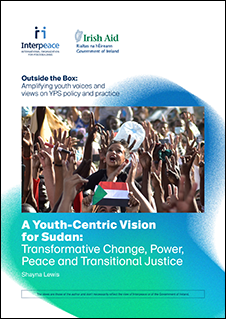A Youth-Centric Vision for Sudan: Transformative Change, Power, Peace and Transitional Justice
Sudanese youth make up over 70% of the population and have consistently proven themselves as peaceful agents of change: as leaders of the 2018/19 revolution which toppled the 30-year dictatorship of Omar al-Bashir, to today providing frontline humanitarian assistance in the context of total war despite being abandoned by the international community. However, these same youth have been violently excluded from all processes of social change, including politics, peacebuilding, and transitional justice. This paper calls for the recognition of Sudanese youth as vital stakeholders in Sudan’s future and for youth inclusion in Sudan to be more than seats at the table. Rather, the paper calls for the embracing of Sudanese youth as co-designers of processes of social change to construct a durable peace and deal with the legacies of past conflict. Decades of overlapping conflicts in Sudan have affected all facets of life, creating significant mental health and psychosocial impacts on successive generations of Sudanese youth. To achieve a durable peace, this paper argues that Sudan requires a transformative approach that deals with root causes of conflict and the legacies of conflict that most affect civilians, such as mental health and psychosocial impacts.
Authors


